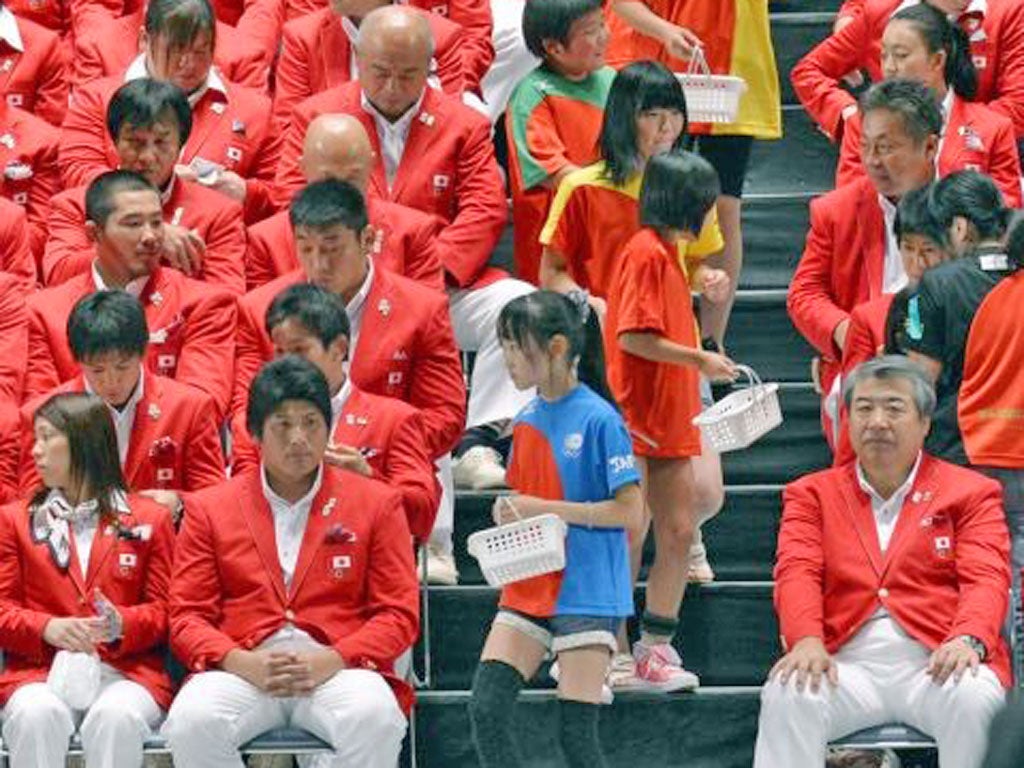Medal spotlight on Japan: Tsunami is always on their mind
Plenty of money has been spent trying to boost the Japanese team's medal haul – but the real world is never far way

First there is the perspective. Last Saturday, Japan's Olympic team gathered in Tokyo for the official send-off to the Games. Amid the usual pomp and fervour that accompany any such occasion each of the athletes was handed an unpainted, hand-carved wooden medal made from the debris left by last year's tsunami that devastated the north-east of the country. The gesture moved javelin thrower Yukifumi Murakami to tears.
On the ribbons attached to the medals are messages written by the children who created them. "Bring back a lot of medals, please," says one. "Waiting for your medals," states another. These simple medals offer perhaps a unique and contradictory combination of both a humbling pointer to the real world that lies beyond gyms, stadiums, swimming pools and fields of play, accompanied by yet another reminder of the particularly intense pressure that sportspeople at this elite level operate under.
Japan have spent heavily on the sportsmen and women sent on their way from the Yoyogi stadium, venue for the 1964 Games, by the country's crown prince, prime minister and 10,000 fans. There may be a ring of Ally McLeod and Scotland's Tartan Army about it – when they were ferried around Hampden and then sent off to bring home the 1978 World Cup – but Japan has a more realistic, if no less pressing, desire for success.
The need to bring back home medals, in particular the gold medals that were in short supply four years ago, is not simply because it is the winning that counts – it is also that Japan is in the process of bidding again to host the Games. That is not a cheap process; £5m has been spent on a pavilion and accompanying publicity in London.
Tokyo lost out to Rio to stage the 2016 Olympics and is now up against Istanbul and Madrid for the 2020 edition with a final decision to be made in September 2013. A recent survey of the three cities found public enthusiasm for hosting the Games at less than 50 per cent in Tokyo – both their rivals were more than 70 per cent. A lack of public support was given as one of the reasons for failing in 2016. Nothing would raise those numbers – and perception matters to the International Olympic Committee – quicker than a raft of sporting success in London.
Japan's national Olympic committee, which has spent £50m on the team for the Games, is all too aware of this. Part of Japan House, next door to the park in the Westfield shopping centre, includes a private area for the team's athletes to relax, watch Japanese TV and eat Japanese food in order to try and ensure they are in the best possible frame of mind to compete. "If Japan does not do well in this Olympics, the excitement and movement for 2020 in Tokyo will cool down," said Takafumi Wada of the Jiji press agency.
The team has been set a target of 15 golds and fifth in the medal table – in Beijing they won nine and finished 10th, something of an embarrassment in the backyard of their historical rivals. It was a hiccup – so the Japanese hope – after steady improvement since their low of 1996, when they finished 23rd. In Athens they came fifth.
To return there, Japan will require success in their traditional areas – judo, gymnastics, wrestling and swimming. Those four sports have brought three-quarters of Japan's Olympic medals. The Japanese team is 293-strong. Like many of the major nations that is a smaller contingent than at recent Games – below 300 for the first time since Sydney 2000.
There is a fear that it will need a run of surprise medals to reach the target because this is not a golden generation of judoka and wrestlers with many of their big (in both senses of the word) hopes heading towards the wrong end of their careers. The dominance enjoyed in the heavyweight divisions in judo is on the wane as it is in women's heavyweight wrestling. Saori Yoshida remains a strong contender in the 55kg wrestling though. One of Japan's great Olympians, she is looking to win a third gold – she has not lost at the Games for more than a decade.
Yoshida is one of three key figures in the team. The dazzling Kohei Uchimura defends the men's all-round individual gymnastics – he is potentially one of the best men the sport has seen. In the pool it is the Frog King who carries Japanese hopes. Kosuke Kitajima is bidding to win both the 100m and 200m breaststroke titles for a third Games in succession. That would be a remarkable sporting achievement – and one that could not be more timely indeed for his hometown of Tokyo.
Subscribe to Independent Premium to bookmark this article
Want to bookmark your favourite articles and stories to read or reference later? Start your Independent Premium subscription today.

Join our commenting forum
Join thought-provoking conversations, follow other Independent readers and see their replies